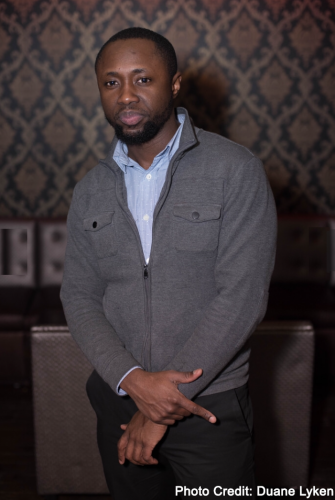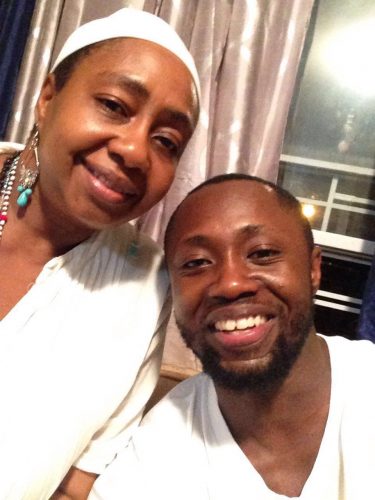
Ansel Bobb didn’t fully understand what was happening the day his mom said goodbye to him. He was only 5 years old. But he could easily recall how he felt – the stinging sadness and the weight of painful emotions. “I was crying, and she was crying,” Ansel said. As was the tradition in Trinidad, the entire family went to the airport to see her plane take off to America.
It was 1991, and a typically hot and sunny island day, when family members gathered at Piarco International Airport. The group included his grandparents and his aunt, who was just three years older than him. Ansel remembered tight hugs and countless kisses as his mother said her final goodbyes before boarding the plane to New York. “She told me she had to go to school to get an education so she could provide for me,” Ansel said. Everyone waved goodbye as his mom, Joanne, took her first steps on the long walkway leading to the plane, along with Uncle Wayne, her brother.
Driving back home from the airport, Ansel said he immediately missed his mom, beyond words, and he became very quiet and despondent. As a young boy, he wasn’t equipped to make the connection, but as he got older, he realized the full impact of his mom leaving – his world and his sense of himself shifted. “I made up in that moment that I was alone, unwanted and separated from everyone – I’m a Lone Ranger.” By his mid-twenties, Ansel figured out that this “Lone Ranger” identity was a way to numb the pain of separation from his mom.
Despite having a pretty normal childhood, Ansel noticed a change in his personality – he was no longer outgoing, playful and talkative, with a passion for football and a taste for mischief. He was becoming more and more quiet, reserved and downhearted. In short, he shut himself down.
Still, life in a middle-class neighborhood in Trinidad with his maternal grandparents and extended family was pretty good – at least from a distance. His mother’s family supported and nurtured him as best they could, but his father, who had not married his mom and was already in another relationship before his mom left, was rarely in the picture. In fact, his dad had a daughter in Trinidad who was born a year after Ansel – while his mom was still there.
“My mom was upset that he [my dad] didn’t show up because it made her feel extra guilty that she wasn’t there,” Ansel added. Though his dad had four other children in Trinidad, Ansel could remember only one time that his siblings – three sisters and a brother – came to visit him.
Ansel and his mom kept in touch through letters and phone calls. He recalled spending about four summers in New York City with her before moving to America for good at 19, after completing high school. (Ansel also got to see his mom when she came back home for Christmas twice.)
“She was in the Bronx – I remember her living in a dorm while she was attending Lehman College,” Ansel said. “I can remember being very happy coming to JFK and seeing my mom. I always had fun with her and my uncle, who lived in Queens. I also stayed with my great-grandmother.”

During summers when he wasn’t visiting his mother, Ansel was enrolled in a government-sponsored sports camp. Soccer was his passion, and he played for various school teams.
Ansel’s early teen years were turbulent. “When I was about 15 or 16, I got very aggressive when people said things I didn’t like,” he admitted. “But things shifted for me when I started listening to reggae – conscious music by Bob Marley, Sizzlar, Buju [Banton]. The message in the music helped mellow him out, he said.
Ansel stayed with his uncle when he first came to live in New York because his mom didn’t have enough space. And though he’d see his mom often, their relationship wasn’t close.
Then in 2011, his life took another turn. Ansel enrolled in a personal development and training course called the Landmark Forum, and the group leader’s message on making peace with our parents resonated with him.
“If you don’t have a complete relationship with your parents, you’ll never have one with anybody else,” said Ansel, echoing the seminar leader. “A lot opened up for me.”
He arranged to have a heart-to-heart talk with his mom over dinner. It was the first time just the two of them had a meal at a formal restaurant. His mom told him exactly what was going on when she left Trinidad, explaining her unhappy relationship with his dad and the pressure she faced from her “in-laws.” She didn’t want to share too much with Ansel when he was younger because she worried that she’d damage his perception of his dad. Ansel also opened up to his mom, sharing how he felt after she left – it was the most meaningful conversation they ever had. At that time, he was 25.
“It’s now a real connection – a special bond,” Ansel said. “We actually share our feelings with each other and have deep conversations, not just small talk. She tells me what’s really going on with her emotionally. In addition, my relationship with myself shifted – my view of myself changed.” He became lighter, brighter and more outgoing.
During their long separation, his mom also moved on with her life. She had a daughter, Imani, in New York about six years after she left Trinidad, and wrote the then-11-year-old Ansel a letter telling him about the birth of his baby sister. Turns out he didn’t read the letter until he was 17 (it somehow got lost) and was moved by his mom’s words reassuring him that he wouldn’t be forgotten because she had another child.
Now 30 years old, Ansel is one of the lucky ones in the “left behind” cohort. His relationship with his mom is healthy and growing even stronger; he has come to terms with his dad; and he’s also getting closer to his stepfather – his mom’s husband and Imani’s dad. As well, Ansel is getting to know, trust and love the Trinidadian siblings with whom he didn’t get to spend much time.
“I urge people to reach out to their parents, regardless of how you were left,” Ansel said. “This will enhance the quality of your life. They are the source of you, and it’s important to reunite with them.”
Story and video by Carol J. Kelly
* * *